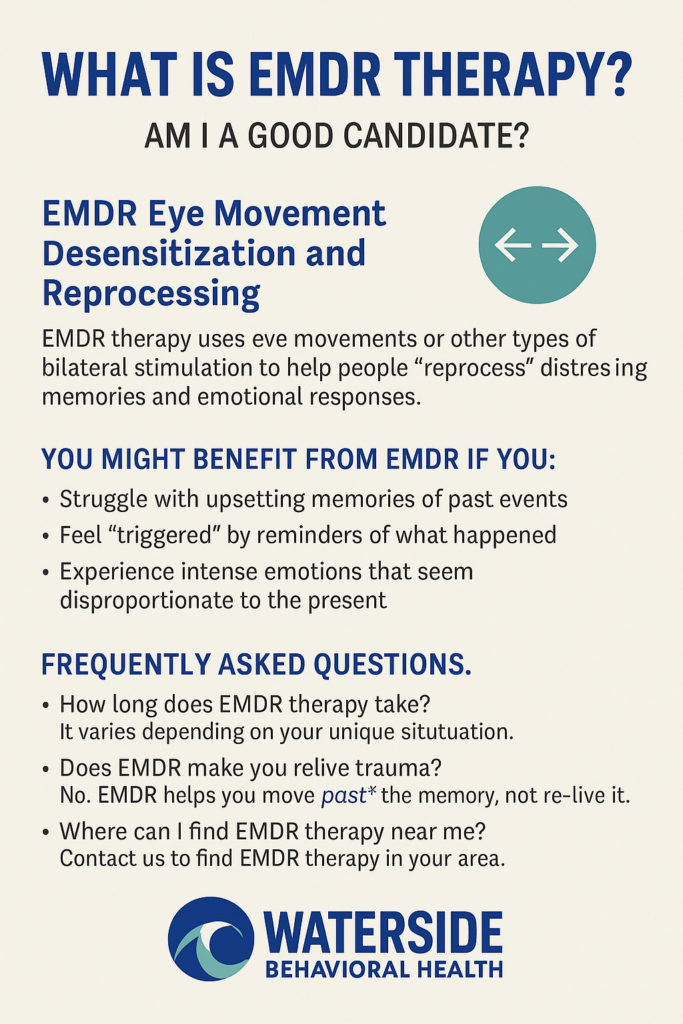If you’re searching for EMDR therapy near me, chances are you’re not looking for a quick fix. You’re looking for relief. For something that finally helps you stop circling the same emotional drain.
You might not call what you’ve experienced “trauma”—but it left a mark. And talk therapy? It’s helped, maybe. But it hasn’t fully cleared the weight you carry.
At Waterside Behavioral Health in Plymouth, MA, we offer EMDR therapy because sometimes the stories we carry aren’t fully stored as words—they live in the body, the nervous system, the reflexes. If that resonates, you’re in the right place.
What Exactly Is EMDR Therapy?
EMDR stands for Eye Movement Desensitization and Reprocessing. It’s a research-backed therapy originally developed for PTSD, but it’s since proven helpful for a wide range of emotional injuries—not just war or assault, but breakups, bullying, medical trauma, childhood neglect, and more.
Unlike traditional talk therapy, EMDR doesn’t require you to go into exhaustive detail about what happened. Instead, it activates your brain’s natural ability to process memories—especially the ones that feel stuck or “frozen.”
The cornerstone of EMDR is bilateral stimulation, most commonly through side-to-side eye movements, tapping, or audio tones. While this happens, your therapist guides you to briefly bring up the memory or distressing thought—just enough to activate it, not relive it. Over time, the emotional charge fades. The memory remains, but it stops hijacking your present.
Who Is EMDR Therapy For?
You don’t have to check every box to benefit from EMDR. In fact, some of the most common reasons people explore EMDR include:
- Persistent anxiety or a sense of dread
- Flashbacks or vivid memories from difficult experiences
- Being “triggered” by things that seem minor to others
- Feeling emotionally numb or disconnected
- Panic attacks or unexplained physical symptoms
- A history of emotionally unavailable or unpredictable caregivers
- Trauma from relationships, betrayal, or emotional abuse
It’s also helpful if you’ve done talk therapy before and hit a wall. EMDR works differently—it’s less about talking it out and more about unlocking the brain’s healing system. That can make it incredibly freeing for people who are “talked out.”
What Happens During an EMDR Session?
Here’s a breakdown of what to expect when you start EMDR at Waterside Behavioral Health:
1. Getting Oriented
The first few sessions are all about preparation. Your therapist will help you feel grounded, safe, and equipped with tools to regulate yourself emotionally. You don’t dive into trauma on Day 1.
2. Choosing a Target
Together, you’ll identify a memory or belief that still feels emotionally charged. Sometimes it’s a big event; other times, it’s a moment that seems small but lingers.
3. Processing with Bilateral Stimulation
While recalling the memory, you’ll follow a visual cue (like a light or finger), hear alternating tones, or receive light taps on your hands. Your brain starts to reprocess the memory—kind of like moving it from the “raw footage” drawer into a file marked “that’s over now.”
4. Integration
After each round, your therapist will check in and help you notice changes—emotionally, physically, and cognitively. This back-and-forth continues until the memory feels less disturbing.
You stay in control the whole time. You can pause or slow down at any moment.
Why EMDR Isn’t Just for “Big T” Trauma
A lot of people think EMDR is only for combat veterans or survivors of extreme violence. That’s a myth.
In reality, EMDR is just as powerful for what we call “small t” traumas—the things that chip away at your sense of safety or self-worth over time. That might be growing up with a critical parent, being ghosted by someone you trusted, or going through a messy divorce.
Your brain doesn’t sort trauma by headlines. It sorts by emotional impact.
If something keeps echoing in your nervous system, EMDR might be the missing piece.
Where Can I Find EMDR Therapy Near Me in Plymouth, MA?
Right here at Waterside Behavioral Health. We offer EMDR therapy as part of our trauma-informed mental health services in Plymouth.
Our clinicians are trained, experienced, and compassionate. We don’t push. We don’t pathologize. We work with you to figure out if EMDR feels like a good fit—and if it’s not, we help you explore what might be.
You don’t have to have a diagnosis. You don’t have to tell your entire story. You just have to be open to exploring healing in a new way.
📍 Find us in Plymouth, MA—serving clients throughout Massachusetts and surrounding regions.
Frequently Asked Questions About EMDR Therapy
How long does EMDR therapy take?
It varies. Some people experience relief in just a few sessions. Others need longer, especially if multiple traumas are being processed. You and your therapist will move at a pace that feels manageable and respectful of your capacity.
Does EMDR therapy make you relive trauma?
No. Unlike exposure therapy, EMDR doesn’t make you fully relive past events. Instead, you bring up just enough of the memory to activate the brain’s processing system—then let the bilateral stimulation do the work.
Is EMDR safe?
Yes, when done by a trained clinician. It can bring up intense emotions, but your therapist will ensure you’re grounded, supported, and able to stop at any point. Safety is always the priority.
Do I need a trauma diagnosis to try EMDR?
Not at all. Many people explore EMDR without a formal PTSD diagnosis. If something feels unresolved, EMDR might be worth considering—diagnosis or not.
What if I don’t remember my trauma clearly?
That’s okay. EMDR works with the emotions and sensations you do have access to. You don’t need a perfect memory for it to be effective.
💬 Ready to Take the Next Step?
You don’t have to carry it all alone—or talk it all out before you start healing. If you’re even a little curious about EMDR therapy near you, reach out.
📞 Call Waterside Behavioral Health at (774) 619-7750 or learn more about our EMDR therapy services in Massachusetts.
We’ll meet you where you are: curious, cautious, and ready for something different.





